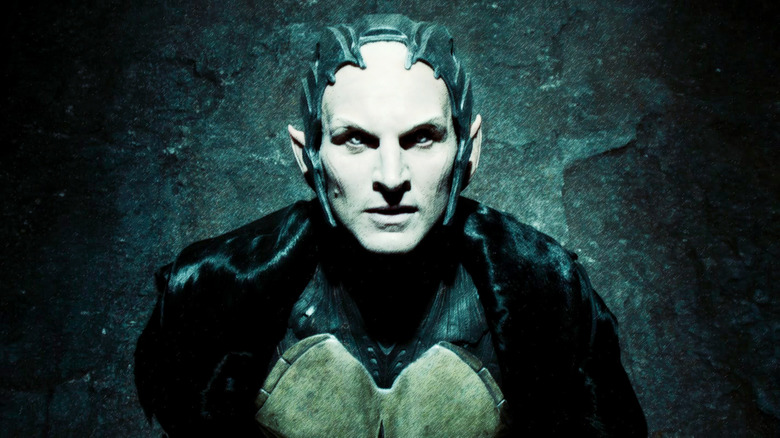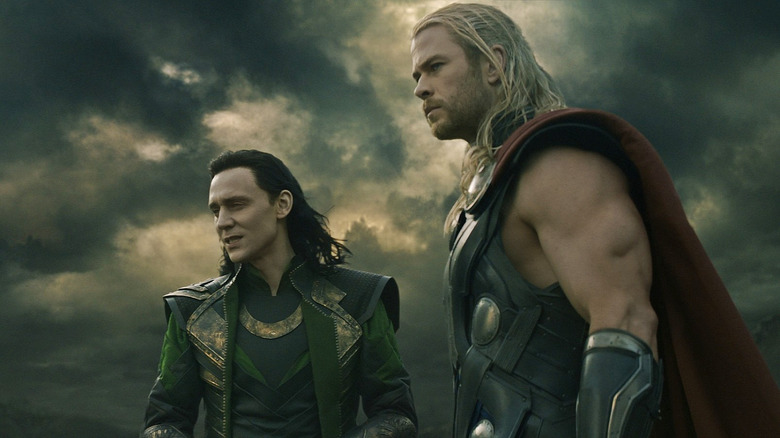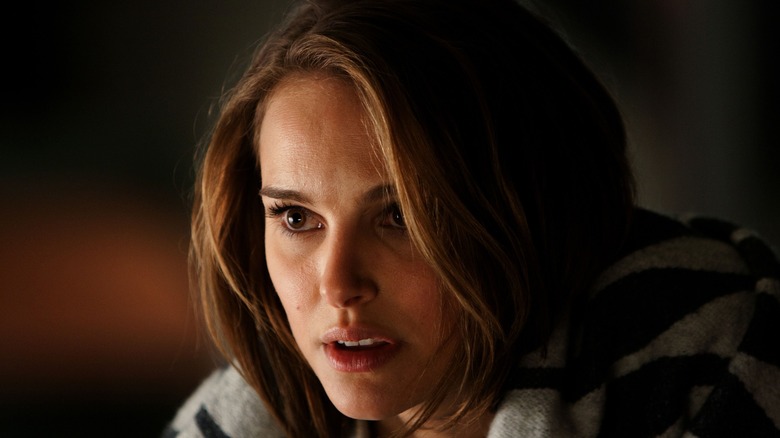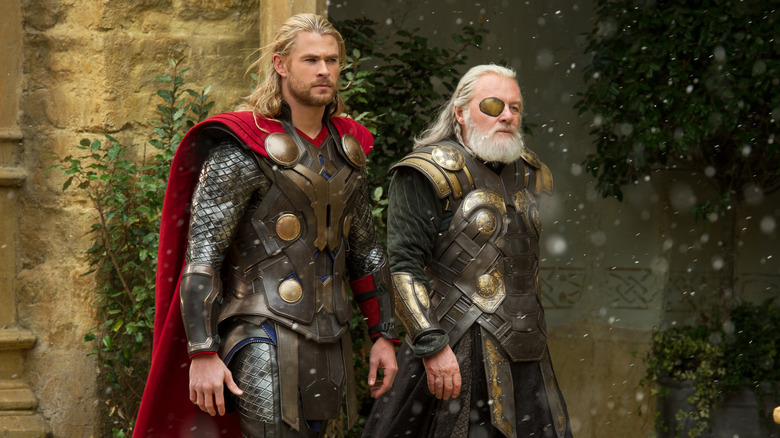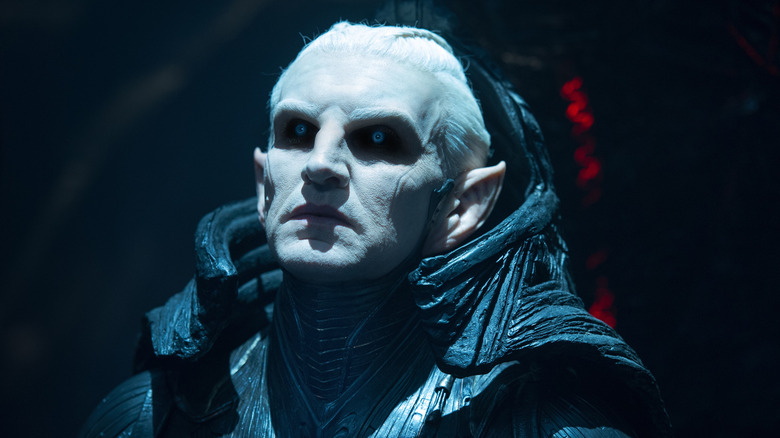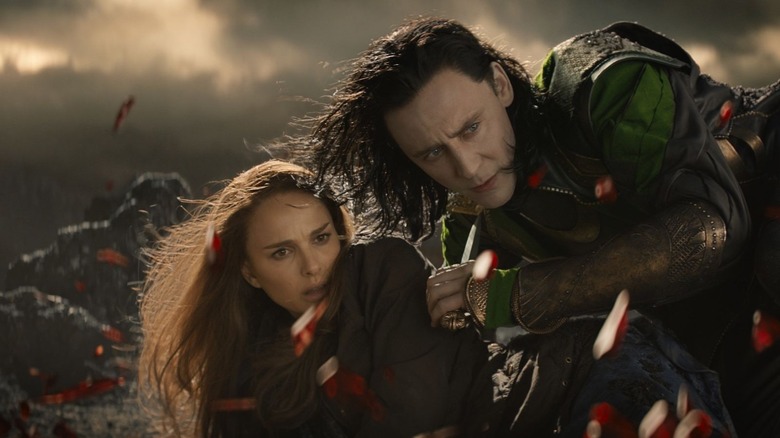Thor: The Dark World Was A Box Office Hit That Also Set A Low Bar For The MCU
(Welcome to Tales from the Box Office, our column that examines box office miracles, disasters, and everything in between, as well as what we can learn from them.)
Released in 2011, "Thor" was a key part of proving that the Marvel Cinematic Universe could work conceptually. Without the rights to characters like Spider-Man or the X-Men, Marvel Studios needed to prove that heroes that had less clout with the general public could still lead successful cinematic adventures. Thanks in no small part to Chris Hemsworth's very likable portrayal of the God of Thunder, the film was a rare success for the fantasy genre (albeit disguised as a superhero film), earning $449 million globally. Thor would then go on to become a big part of 2012's "The Avengers," which was an even bigger, record-breaking success.
By that point, the MCU had more than proven its concept. These disparate franchises that existed in the same universe had captured the imagination of moviegoers the world over. It was time for Kevin Feige and his crew at Marvel Studios to move onto something bigger: Phase 2. But bigger doesn't always mean better. Such was the case with 2013's "Thor: The Dark World," the first solo sequel for Hemsworth, which, a full decade later, is still regarded as one of the least impressive MCU films to date.
In this week's Tales from the Box Office, in honor of the 10th anniversary of "The Dark World," we're looking back at the film, how it came to be, how a rushed production timeline made things pretty messy, what happened when the movie hit theaters, and what lessons we can learn from it all these years later. Let's dig in, shall we?
The movie: Thor: The Dark World
"Thor will go off into a new adventure," Feige said to D23 Magazine in 2011, speaking about what was going to happen after "The Avengers." While this was bordering on putting the cart before the horse, Marvel had every reason to be optimistic after "Iron Man" became an unexpected juggernaut, taking in $585 million worldwide against modest expectations. That success helped pave the way for Disney to buy Marvel in 2009, which only further heightened the need for expansion in the MCU.
"Thor 2" was officially announced by Disney on June 30, 2011, while the studio was neck-deep in production on "The Avengers." At this point, the train was moving down the tracks and, to continue to succeed as it was designed, this was how things needed to be. Phase 2 of the MCU consisted of six films in total. It would kick off with "Iron Man 3" followed by the "Thor" sequel, with "Captain America: The Winter Soldier," "Guardians of the Galaxy," "Avengers: Age of Ultron," and "Ant-Man" to follow.
It represented a good mix of already-familiar heroes as well as new potential franchises. It's a model that Marvel still tries to employ to this day, with varying degrees of success. Kenneth Branagh directed the first "Thor" but would not return for the sequel. Speaking to the University School of Film & Television in 2015 (via THR), the filmmaker explained that the turnaround was far too fast.
"It was a long time [making the first film] and they were way too quick for me to get straight back into another. [But] it was a pleasurable experience and a film I'm very proud of."
Assembling a new team
Don Payne, who was one of the writers on the first "Thor," was hired to pen the screenplay for the follow-up. Brian Kirk ("Boardwalk Empire") entered negotiations to direct the film but didn't end up signing on. Patty Jenkins ("Monster") was actually announced as the film's director in October 2011, only to eventually depart the project and go on to direct the smash hit "Wonder Woman" for DC. "On a movie that didn't require a woman at all — they hired me. So, I've always been super grateful to them even though it didn't work out," Jenkins said in 2021 of the experience. As for why it didn't work out? She didn't believe in the story:
"They wanted to do a story that I thought was not going to succeed, and I knew it couldn't be me [to fail]. It couldn't be me that had that happen. If they hired any guy to do it, it wouldn't be a big deal, but I knew in my heart that I could not make a good movie out of the story they wanted to do."
It was at this point the cracks started to show. More shuffling behind the scenes took place. Robert Rodat, who won an Oscar for "Saving Private Ryan," was brought in to rewrite the script. By December, Alan Taylor ("Game of Thrones") had officially been hired to occupy the director's chair following Jenkins' departure. He would go the distance with the project.
"[Marvel president] Kevin Feige was always smart about looking at what worked and didn't in the last iteration and trying to retool from that," Taylor said to The Hollywood Reporter in 2021. "So I came in to 'bring some 'Game of Thrones' to it.'" Taylor did try to bring some big fantasy scale to the film, which sees Thor reluctantly teaming up with Tom Hiddleston's Loki to defeat the Dark Elf Malekith. Natalie Portman's Jane Foster also gets infected with something called the Aether, which ends up being one of the Infinity Stones.
'We don't know who's gonna get credit'
Things changed dramatically in the edit, with lots of reshoots and retooling. What eventually hit theaters didn't resemble Taylor's original cut. Speaking further in that same THR interview, the director explained what his version might have looked like:
"The version I had started off with had more childlike wonder; there was this imagery of children, which started the whole thing. There was a slightly more magical quality. There was weird stuff going on back on Earth because of the convergence that allowed for some of these magical realism things [...] People [such as Loki] who had died were not dead, people who had broken up were back together again. I think I would like my version."
Mads Mikkelsen and Benedict Cumberbatch — both of whom would eventually join the MCU in other roles — were in talks to play Malekith. In the end, it was Christopher Eccleston ("Doctor Who") who won the role. The actor didn't exactly have a good time, to put it mildly. "Working on something like 'G.I. Joe' was horrendous. I just wanted to cut my throat every day. And 'Thor?' Just a gun in your mouth," the actor said in reflection in 2018.
This was one of the first times that the beast that the MCU had become started to show some cracks. The production deadline was very tight as a result of the release date "The Dark World" had to hit. The script was also always in flux, it seemed.
Christopher Markus and Stephen McFeely, who would go on to write "Avengers: Infinity War" and "Avengers: Endgame" as well as several other MCU films, ended up getting credited on the film's screenplay alongside Christopher L. Yost, with Payne and Rodat getting a story credit. "To be honest, we don't know who's gonna get credit on that movie. There are a lot of people who contributed to it so it may not be us, we don't know," McFeely said in April 2013. Never a good sign.
The financial journey
"Thor: The Dark World" had originally been set to hit theaters in the summer of 2013 but, ultimately, Disney pushed that back to the fall. The film debuted on November 8, with absolutely no direct competition to speak of. The film easily topped the charts on its opening weekend, taking in $85.7 million. That was a heck of a lot more than the first "Thor," which debuted to $65.7 million two years earlier. That was the true power of the MCU showing. Everything felt essential to viewers after "Avengers." So much so that the middling reviews for Thor's second solo outing hardly mattered. To date, it remains one of the worst-reviewed entries in the franchise (read our review from 2013 here).
The film continued to do its thing right up to the release of "The Winter Solider" in April 2014. "The Dark World" finished its run with $206.3 million domestically to go with a very impressive $438.4 million internationally for a grand total of $644.7 million. Even with a $170 million budget, that represented an absolute win for Disney and Marvel Studios — at least financially speaking. Behind the scenes, getting the movie over the finish line was tricky, and putting out middling efforts like this forever wouldn't go a long way in helping the franchise. Marvel kind of got away with one here.
Even Chris Hemsworth agrees that the film isn't all that great. "The first one is good, the second one is meh ... What masculinity was, the classic archetype — it just all starts to feel very familiar. I was so aware that we were right on the edge," the actor said candidly speaking in 2018. Despite setting something of a low bar for the MCU moving forward, it was still a major success that most studios would kill for. It made comparable money to "Man of Steel" ($668 million worldwide), and Superman is one of the biggest superheroes on the planet. It speaks volumes about the power of the MCU at that time.
The lessons contained within
The relative "meh" of "The Dark World" was greatly overshadowed thanks to a pair of absolute bangers in 2014, as both "Captain America: The Winter Soldier" and "Guardians of the Galaxy" were not only massive commercial hits, but are still considered amongst the best MCU films to date. Thor's second outing wasn't even a speed bump, really. But what's markedly important is the fact that Kevin Feige and the rest of the brass at Marvel Studios took it all to heart. They didn't just ignore what went wrong. They were more than willing to course correct.
Case in point, they allowed a director with a real vision, Taika Waititi ("What We Do in the Shadows") to come in and reinvent the franchise in a big way. 2017's "Thor: Ragnarok" was a bold shift — with a more comedic tone — that completely won over audiences and critics alike. It, much like "The Winter Soldier," is now looked upon as one of the finer MCU entries. It was also an even bigger hit, taking in $854 million worldwide. That doesn't happen if Feige just looks at the balance sheet and says something along the lines of, "We're fine."
As the MCU is facing a series of major challenges right now — from critically panned shows on Disney+ like "Secret Invasion" to box office letdowns like "Ant-Man and the Wasp: Quantumania" — it's worth remembering that Marvel has, historically, been able to pivot when things aren't working. "The Dark World" wasn't a home run, but Feige and Co. learned the right lessons from it and shifted course moving forward. The situation right now feels a bit more dire, with projects like "Blade" and others seemingly in turmoil. That said, if there is any evidence that Feige knows how to steer a ship in the right direction after veering off course, it's what happened in the aftermath of "Thor: The Dark World."
